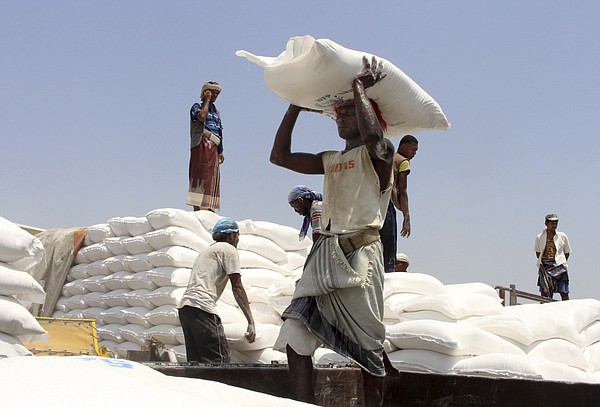Watch “Hunger Ward,” A Film About the Man-Made Famine in Yemen
Dave DeCamp / Antiwar.com
(January 4, 2021) — On Saturday, January 16th, at 2pm ET there will be a free virtual screening of “Hunger Ward,” a film that documents the man-made famine in Yemen that is a direct result of the US-Saudi siege on the country. The screening will be followed by a Zoom panel featuring US Rep. Ro Khanna and UK MP Andrew Mitchell. Register here.
About the Film: This unflinching look at the human-caused famine in Yemen follows health care workers Dr. Aida Asladeeq and nurse Mekkia Mahdi as they work to save the lives of hunger-stricken children in two therapeutic feeding centers, against the backdrop of a forgotten war.
Yemen: Five Years of Conflict Leaves Millions of Children Suffering
Corporate politicians try and defend the military actions of the Saudi-led coalition in Yemen by sheer unadulterated lies. UK Foreign Office Minister Alistair Burt in a debate in the House of Commons blithely stated that the Saudi-led coalition had not breached any international law.
UN: Time Running Out to Avert Yemen Famine
Margaret Besheer / Voice of America News
NEW YORK (December 10, 2020) —As the World Food Program was awarded the Nobel Peace Prize on Thursday for its work to eliminate hunger, its chief urged the world to prevent famine.
For Yemen, time is running out.
“My tragic duty today is to tell you: Famine is at humanity’s doorstep. For millions and millions of people on Earth,” WFP Executive Director David Beasley said in his Nobel message.
In Yemen, UN data on food insecurity released this month indicated that pockets of famine-like conditions were already present, and the number of Yemenis experiencing this level of food insecurity could nearly triple from 16,500 currently to 47,000 people by June.
Another 3.6 million Yemenis are just one degree of hunger away from famine, and that could rise to 5 million by June.
In total, the UN said, more than 16 million people -– over half of Yemen’s population — will be facing crisis levels of food insecurity by mid-2021.
“Yemen is again being starved,” UN humanitarian chief Mark Lowcock said Thursday at a meeting of donor countries.

Men deliver UN World Food Program aid in Aslam, Hajjah, Yemen, Sept. 21, 2018.
Man-made Catastrophe
More than five years of war between the Saudi Arabian-backed government of President Abed Rabbo Mansour Hadi and Iranian backed-Houthi rebels has pushed the Middle East’s poorest country to the brink.
“The link between hunger and conflict is very clear,” said WFP Deputy Director Amir Abdulla. “But in Yemen what this means is that the people living in areas affected by conflict paid 50% or more above what they were paying at the start of the year, just on basic staple foods.”
With an economic crisis — the Yemeni rial has plummeted to an all-time low — and 80% of the country’s food imported, skyrocketing food prices have plunged millions of families into crisis.
“Sixteen million people don’t know where their next meal will come from,” Abdulla said.
Henrietta Fore, head of the UN children’s agency, UNICEF, described the lives of Yemeni children as “a waking nightmare.” She said 12 million needed urgent humanitarian assistance and protection, while more than 2 million were acutely malnourished.
“We believe famine-like conditions have already begun for some children,” Fore said. “These are not just numbers on a page. These are millions of individual tragedies. Millions of blighted futures.”

A malnourished boy lies in a bed waiting to receive treatment at a feeding center at Al-Sabeen hospital in Sanaa, Yemen, Nov. 23, 2019.
For children, malnourishment has long-term consequences, including stunting their growth and impairing their cognitive development.
“Nobody cares for Yemen more than the people and the government of Saudi Arabia,” said the kingdom’s UN envoy, Abdallah Al-Mouallimi. He touted Riyadh’s humanitarian and development contributions, which he said have exceeded $17 billion since 2015.
Saudi Arabia is a main protagonist of the conflict. The kingdom has been strongly criticized by human rights groups and the United Nations for airstrikes that have struck hospitals and schools and killed civilians, including scores of children.
Yemen faced a similar threat of famine in late 2018, but it was averted with an emergency economic package and the widespread scale-up of humanitarian assistance.
But this year, UN agencies have received only about half as much money as in 2019. As a result, UN officials have already taken the hard decision to cut rations to 9 million people and halt some critical programs.
The World Food Program said $1.9 billion is needed to avert famine next year.
Posted in accordance with Title 17, Section 107, US Code, for noncommercial, educational purposes.